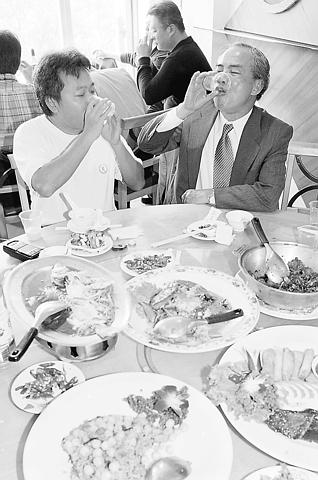National Assembly deputies, criticized as being "self-serving" for adopting an amendment to extend their own terms of office last year, made amends by passing another reform package that marginalized the Assembly on Monday.
"This [positive image] is the only thing we've got from this reform. We can at least face the public, by showing them that we've achieved goals [complying with public expectations]," said Chen Chin-te (
Chen and caucus chief executive Liu I-teh (

PHOTO: CHEN CHENG-CHANG, TAIPEI TIMES
Although Chen and Liu argued that the extension was a necessary evil -- in exchange for support from the deputies for a plan to freeze the Assembly and attain the DPP's goal for reform -- public criticism was so fierce that Chen's colleagues launched a recall bid against him. The campaign, however, was unsuccessful.
Under public pressure, the KMT also revoked the membership of then-speaker Su Nan-cheng (
The minority New Party -- which had refused to endorse the amendment -- filed an application with the Council of Grand Justices for a constitutional interpretation soon after it was adopted.
The Grand Justices issued their ruling invalidating the extension amendment, along with the one to freeze the Assembly in March.
With just two months left before the expiration of the deputies' term, Chen and Liu met with the KMT caucus again and agreed to new measures calculated to make up for their failure.
The marginalization plan -- which was intended to turn the Assembly into a non-standing body starting May 20 -- was hammered out in just one round of talks.
The revised plan won the support of the New Party. "This reform is like atoning for a big mistake," agreed Wang Kao-cheng (
Wang said the plan was important to Taiwan's constitutional development because it moved most of the Assembly's powers to the Legislative Yuan -- ? resolving the long-term problem deriving from the existence of two executive bodies.
Wang said that previously the National Assembly was required to convene at least once a year and could also propose extraordinary sessions.
This was despite the fact, he said, that the Assembly's main functions were to amend the Constitution and confirm the president's appointment of Judicial Yuan, Control Yuan and Examination Yuan members.
"The need to do these jobs doesn't emerge very often. But Assembly deputies would always come up with some excuse to lengthen the session so that they could get paid for the meeting," Wang said.
Wang said marginalizing the Assembly would save taxpayers' money.
Also, under the reform, the threshold for amending the Constitution has been raised.
To amend the Constitution now a vote will need to be passed in the legislature with at least a three quarters majority, then submitted to the Assembly for a final confirmation, which also needs 75 percent support.
"This can prevent politicians from adopting any self-serving measures," Wang said.
Chen said he was glad of the opportunity to promote the reform, which he claimed was a major step forward in Taiwan's political system.
"There is no way to stop public opinion abolishing the National Assembly," Chen said.

CHAOS: Iranians took to the streets playing celebratory music after reports of Khamenei’s death on Saturday, while mourners also gathered in Tehran yesterday Iranian Supreme Leader Ayatollah Ali Khamenei was killed in a major attack on Iran launched by Israel and the US, throwing the future of the Islamic republic into doubt and raising the risk of regional instability. Iranian state television and the state-run IRNA news agency announced the 86-year-old’s death early yesterday. US President Donald Trump said it gave Iranians their “greatest chance” to “take back” their country. The announcements came after a joint US and Israeli aerial bombardment that targeted Iranian military and governmental sites. Trump said the “heavy and pinpoint bombing” would continue through the week or as long

TRUST: The KMT said it respected the US’ timing and considerations, and hoped it would continue to honor its commitments to helping Taiwan bolster its defenses and deterrence US President Donald Trump is delaying a multibillion-dollar arms sale to Taiwan to ensure his visit to Beijing is successful, a New York Times report said. The weapons sales package has stalled in the US Department of State, the report said, citing US officials it did not identify. The White House has told agencies not to push forward ahead of Trump’s meeting with Chinese President Xi Jinping (習近平), it said. The two last month held a phone call to discuss trade and geopolitical flashpoints ahead of the summit. Xi raised the Taiwan issue and urged the US to handle arms sales to

State-run CPC Corp, Taiwan (CPC, 台灣中油) yesterday said that it had confirmed on Saturday night with its liquefied natural gas (LNG) and crude oil suppliers that shipments are proceeding as scheduled and that domestic supplies remain unaffected. The CPC yesterday announced the gasoline and diesel prices will rise by NT$0.2 and NT$0.4 per liter, respectively, starting Monday, citing Middle East tensions and blizzards in the eastern United States. CPC also iterated it has been reducing the proportion of crude oil imports from the Middle East and diversifying its supply sources in the past few years in response to geopolitical risks, expanding

Pro-democracy media tycoon Jimmy Lai’s (黎智英) fraud conviction and prison sentence were yesterday overturned by a Hong Kong court, in a surprise legal decision that comes soon after Lai was jailed for 20 years on a separate national security charge. Judges Jeremy Poon (潘兆初), Anthea Pang (彭寶琴) and Derek Pang (彭偉昌) said in the judgement that they allowed the appeal from Lai, and another defendant in the case, to proceed, as a lower court judge had “erred.” “The Court of Appeal gave them leave to appeal against their conviction, allowed their appeals, quashed the convictions and set aside the sentences,” the judges